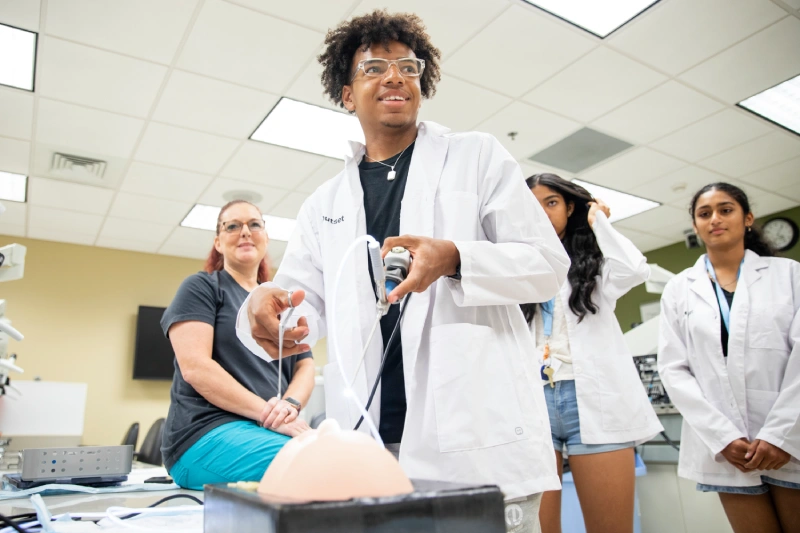Breaking into the medical field isn’t easy, but getting a head start can make all the difference. If you’re a high school student dreaming of a medical career, gaining early experience can help you determine if it’s the right path. Medical programs allow you to explore different specialties, get hands-on practice, and build a strong foundation for the future.
These programs don’t just help you learn—they also make your college and medical school applications stand out. Schools look for students who take initiative and show real passion for the field. In this article, we’ll dive into the benefits of medical programs for high school students and share tips on choosing the right one.
Benefits of Medical Programs for High School Students
Early Exposure to the Medical Field
Medical programs for high school students are like your backstage pass to the world of medicine. You'll get firsthand experience in medical settings such as hospitals, labs, and clinics.
Whether you're shadowing doctors or volunteering at a community health clinic, you'll see what healthcare professionals do each day. This early exposure helps you determine if a medical career is right for you.
Hands-On Learning and Practical Skills
These programs aren't just about sitting in a classroom; they're about rolling up your sleeves and engaging in real activities. You might learn basic medical procedures, participate in patient care, or assist with lab research.
This hands-on learning develops critical thinking, problem-solving, and teamwork skills essential in medicine.
Stronger College Applications
Getting into college, especially pre-med programs, is competitive. Participating in medical programs demonstrates initiative and a genuine passion for medicine.
Admissions officers take notice when they see applicants who have gone the extra mile to gain experience. You'll have valuable experiences to include in your statements and interviews, making your application stand out.
Networking and Mentorship Opportunities
Connecting with doctors, medical professionals, and peers who share your interests is a significant benefit. Medical programs provide opportunities to build professional relationships that may lead to internships and future recommendations.
Having mentors in the field can guide you on your journey and open doors you might not have found alone.
Competitive Edge for Pre-Med and Medical School
By immersing yourself in the medical field early, you'll be ahead of the game when you start your undergraduate studies. You'll have a foundation in fundamental medical concepts, making coursework more manageable.
The experience you've gained can contribute to your medical school applications, giving you a competitive edge over other applicants.
Types of Medical Programs Available
Hospital Internships and Shadowing Programs
If you're eager to see what goes on inside a hospital, internships and shadowing programs are a great start. These opportunities allow you to observe doctors and healthcare professionals in real medical settings. You might assist with charting, support medical staff with various tasks, or simply watch and learn as professionals go about their day.
Pre-College Summer Medical Programs
Many universities offer summer programs specifically designed for high school students interested in medicine. These programs often include lectures from faculty, lab sessions, and hands-on clinical experiences. They're a fantastic way to get a taste of college-level coursework and explore different areas of medicine.
Research Programs and STEM Camps
If you're fascinated by the scientific side of healthcare, research programs and STEM camps might be right up your alley. These programs let you dive into biomedical research, participate in lab projects, and sometimes even contribute to scholarly work. You'll learn about cutting-edge developments and might even present your findings.
Volunteer Opportunities in Healthcare
Volunteering is another excellent way to gain experience. Whether it's at a hospital, clinic, or community health program, volunteering exposes you to the healthcare environment and allows you to give back to your community. It's also a way to develop soft skills like empathy and communication.
Choosing the Right Medical Program: Things to Consider
Selecting the right medical program can feel overwhelming, but considering a few key factors can help you make the best choice. A well-chosen program can provide valuable experience, align with your interests, and enhance your college applications.
Consider Location, Cost, Duration, and Specialization
Think about where the program is located and whether attending is feasible. Some programs take place on college campuses, while others are based in hospitals or research facilities. Virtual programs are also an option if traveling isn’t possible.
Cost is another major factor. Consider not only tuition but also travel, accommodation, and material fees. Look into financial aid, scholarships, or grants that may be available to help cover expenses.
The duration of the program should also fit your schedule. Some programs last just a weekend, while others run for several weeks or months. If you have school, work, or extracurricular commitments, make sure the program aligns with your availability.
Finally, consider the program’s focus. Some provide general exposure to the medical field, while others dive deep into specializations like surgery, neuroscience, or biomedical research. Choose a program that matches your interests and future aspirations.
Check the Level of Hands-On Experience
Programs vary in how much practical experience they provide. Some offer direct interaction with patients through hospital shadowing or volunteering, while others focus on laboratory work or classroom-based learning. If gaining hands-on skills is a priority for you, look for programs that emphasize clinical simulations, dissection labs, or patient care experience.
Assess the Program’s Reputation and Credentials
Look for programs affiliated with reputable universities, hospitals, or medical organizations. Well-established programs often provide better networking opportunities, experienced instructors, and higher-quality training. Reading reviews from past participants or checking program rankings can also help you determine if it's a good fit.
Look at the Application Requirements
Some medical programs have competitive admissions processes and require applications with essays, recommendation letters, or transcripts. Others may be open to all students on a first-come, first-served basis. Check deadlines and eligibility requirements early to avoid missing out on opportunities.
Consider Networking and Mentorship Opportunities
A strong medical program should provide access to professionals who can offer guidance and insight into the field. Programs that include mentorship, guest lectures from physicians, or opportunities to network with medical students and professionals can be especially valuable for long-term career growth.
Explore Post-Program Benefits
Some programs offer benefits beyond the experience, such as completion certificates, college credit, or access to alumni networks. These extras can help strengthen your college application or stay connected with mentors and peers in the medical field.
Final Thoughts
Participating in medical programs as a high school student offers many opportunities. From gaining early exposure to the medical field and developing practical skills to strengthening your college applications and building a professional network, these programs can significantly jumpstart your medical career. They provide invaluable experiences that set you apart and give you a glimpse into the life of a medical professional.
If you're considering a career in medicine, don't hesitate to explore these programs. Taking advantage of these opportunities now can lead to long-term success in the medical field. Early exposure helps you confirm your passion for medicine and equips you with the knowledge and skills that will benefit you throughout your educational journey and beyond.
Outset Summer Program
The Outset Summer Program is an immersive experience that offers high school students a chance to delve deep into the medical field. Over several weeks, participants engage in hands-on learning, including clinical simulations, laboratory experiments, and mentorship sessions with medical professionals.
The program emphasizes medicine's scientific and compassionate sides, helping students develop a well-rounded understanding of what it means to be a healthcare provider.
Beyond the hands-on activities, the Outset Summer Program fosters a community of like-minded peers. Students collaborate on projects, discuss current medical issues, and build networks that last beyond the summer. The program aims to inspire the next generation of medical professionals by providing real-world experiences and personal growth opportunities.









.jpg)




.png)








